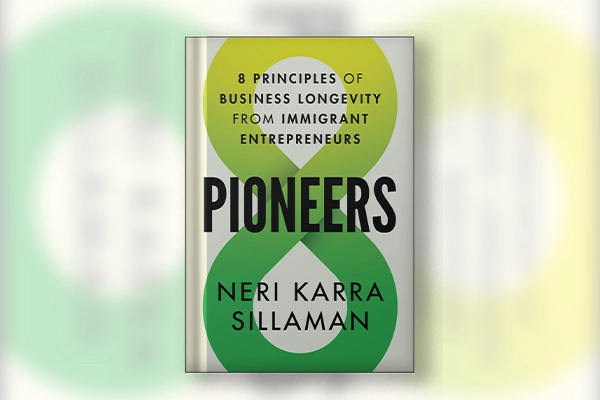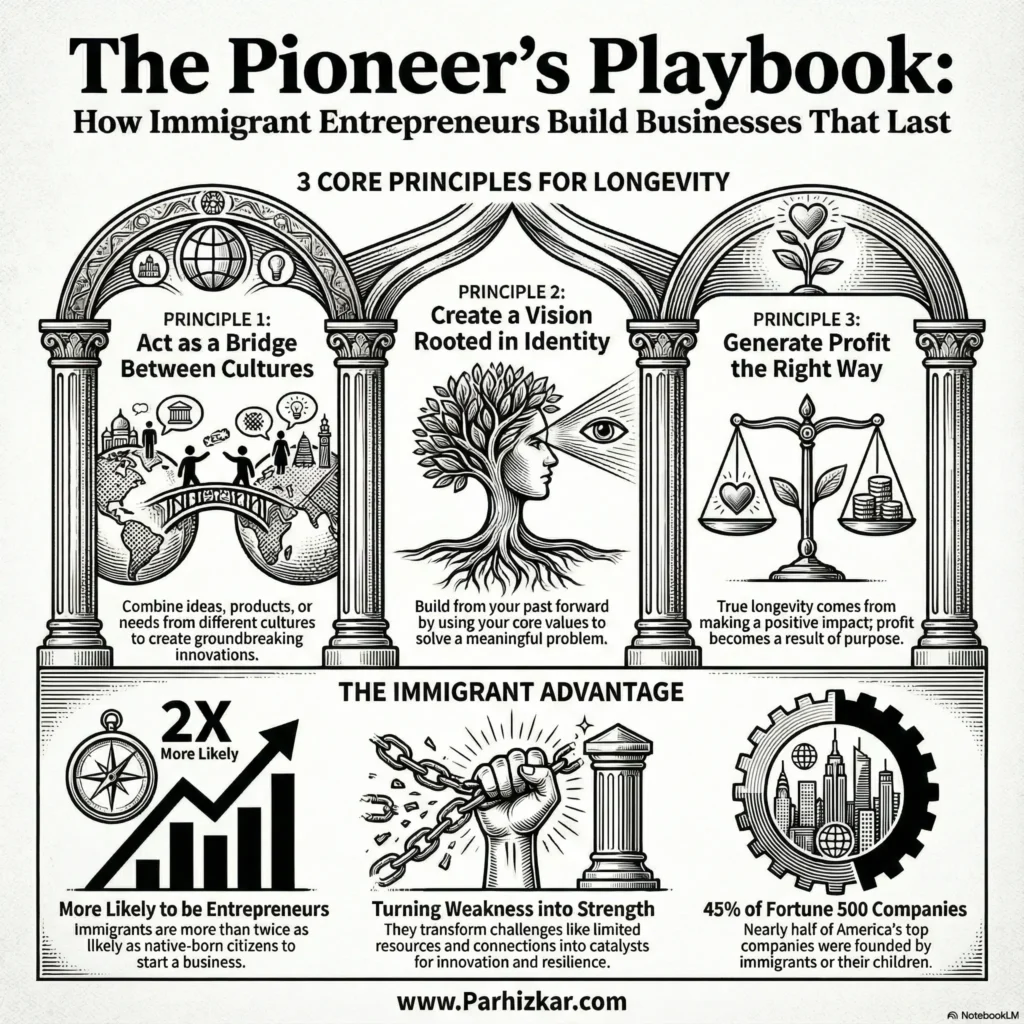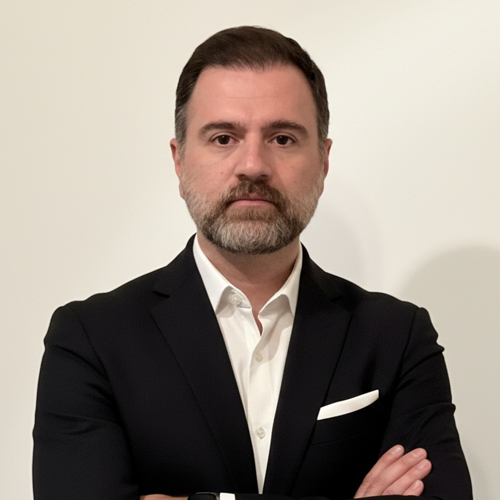Pioneers

Pioneers by Neri Karra Sillaman challenges conventional wisdom on business longevity by highlighting the unique skillsets and strategies employed by immigrant entrepreneurs. The book argues that true business longevity extends beyond mere profit-making to building a lasting positive impact and legacy, emphasizing kindness and community over relentless financial gain. Through personal experiences, academic research, and interviews with successful immigrant entrepreneurs, Sillaman distills eight core principles that any entrepreneur can apply. These principles underscore adaptability, purpose-driven vision, authentic connections, ethical profit generation, community building, resilience in the face of rejection, sustainable growth, and proactive engagement with luck.
Challenging Conventional Wisdom on Business Longevity
Sillaman critiques existing literature on business longevity, arguing that it often misrepresents the path to sustained success by focusing on large, established companies and outdated models.
- Critique of Traditional Literature: Conventional books like “In Search of Excellence,” “Built to Last,” and “Good to Great” are faulted for their “methodological flaws,” including “focusing on giant firms that inhabited different ecosystems,” overgeneralizing from specific geographies and industries, and lacking longitudinal data. The author notes that “Of the 30 exceptional enterprises featured in In Search of Excellence in 1982, only 9 were performing above average 20 years later (and the same number were outright failures).”
- Defining True Longevity: The book redefines business longevity not as continuous profit generation, but as the creation of a “legacy that transcends profit.” As Sillaman states, “real longevity does not come from the money you take but from the difference you make.” This means building a company “that you can be proud of and that makes a difference in the long term.”
- Myths of Business Longevity (and Reality):Myth 1: You don’t need a great idea. Reality: Compelling initial ideas are foundational.
- Myth 2: Longevity is about maintaining stability. Reality: It’s about balancing stability with adaptability to change.
- Myth 3: Only companies with large capital achieve longevity. Reality: Many start small and grow through strategic decisions and customer loyalty. “Starting a business with an abundance of resources may not always be a good idea as it can stifle creativity.”
- Myth 4: Continual growth is a must. Reality: Sustainable growth, prioritizing long-term stability, is more crucial.
- Myth 5: Must succeed locally first. Reality: Modern technology allows “born global” firms.
- Myth 6: Best companies are top market players. Reality: Resilience and adaptability are more important; carving out niches or holding second/third positions can be successful (“the giant’s shadow” effect).
- Myth 7: More customers always means longer-lasting business. Reality: Quality of relationships and customer loyalty often trump quantity.
- Myth 8: Longevity is mainly about competitive advantage in products/services. Reality: Corporate culture and employee engagement are equally vital.
The Power of Immigrant Entrepreneurship
Immigrant entrepreneurs consistently outperform their native-born counterparts in terms of business growth and longevity, bringing unique strengths and worldviews.
- Striking Success Rates: “Immigrants make up 13% of the U.S. population but 28% of its entrepreneurs.” Additionally, “Among the Fortune 500 companies, 45% were founded by immigrants; 80% of billion-dollar startups have a founder or leading executive who is a first- or second-generation immigrant.” Immigrant-founded companies also “grow faster and survive longer than those founded by natives.”
- The American Dream & Global Phenomenon: The book frames the American Dream as a two-way street, where immigrants both realize their dreams and “make America’s dream a reality too.” This phenomenon is global, with migrants across the world driven by a “determination to build something better than what they had left behind.”
- Underlying Reasons for Success:Necessity Entrepreneurship (Critiqued): While some research points to immigrants being “forced into entrepreneurship for lack of other options,” Sillaman argues this is an “overly simplistic view,” often overlooking the agency and diverse options immigrants create for themselves.
- Skills, Resources, and Capabilities: Immigrants possess unique skillsets that, though common in their home countries, may be “scarce in their new home,” allowing them to “spot opportunities.” Examples include Hamdi Ulukaya (Chobani) and his dairy expertise.
- Personality Traits: Immigrants often exhibit a predisposition to “taking risks,” “adaptability,” “comfort with uncertainty,” and the ability to operate “in multiple cultures concurrently.” Courage, willpower, and positivity are also prominent.
- Influence of Family: Immigrant enterprises are often “family-owned or at least start small,” with family playing “key roles in identifying opportunities, providing funding, working for the new company, acting as role models, or providing a cultural influence.”
- Ethnic Ties and Networks: “Homophily” – the tendency for “birds of a feather flock together” – provides “safety nets for new migrants, offering them opportunities for work” and access to “potential customers and staff.” The Vietnamese nail salon industry, inspired by Tippi Hedren, is a key example.
The 8 Principles of Business Longevity from Immigrant Entrepreneurs
The core of “Pioneers” lies in these actionable principles, each illustrated with compelling examples.
Principle 1: Be a Bridge Across Cultures
- Main Idea: Immigrant entrepreneurs excel at “mixing cultures” to create innovative products and services that appeal across diverse markets. Their “cross-cultural experiences and knowledge” make them uniquely capable of identifying and developing opportunities that others miss.
- Key Aspects:Opportunity Identification: Immigrants can “look at the same situation as a native-born entrepreneur but see something different,” leading to “fortuitous discovery” or creative combination of resources (e.g., Dominique Ansel’s Cronut, Numi Organic Tea, Cobra Beer).
- Building Cross-Cultural Connections: Expertise in forging ties with diverse partners, navigating “institutional distance” (laws, regulations, consumer preferences), and understanding different communication styles.
- Inflection Points: Immigrant entrepreneurs are “uniquely well-equipped to anticipate cultural change before it occurs,” drawing on their international experience to “read tomorrow’s newspaper today” (e.g., Hernan Lopez’s Wondery).
- Example: Dominique Ansel (Cronut) mixed French croissant technique with American donut appeal. Karan Bilimoria (Cobra Beer) combined Indian brewing expertise with British market knowledge for a beer that suited Indian cuisine in the UK.
Principle 2: Build from the Past Forward and the Future Back
- Main Idea: A clear, guiding vision rooted in one’s identity and a desire to solve problems is crucial. This vision inspires action and aligns efforts.
- Key Aspects (3-I Framework):Identity: Starts “by looking inward, into their own complex pasts and identities, to understand what really mattered to them.” This reveals core values.
- Intention: Identifies a “disconnect between…identity and the world in which they find themselves,” prompting a desire to “change something.” The focus is on finding “the right problem to solve,” not just chasing customers.
- Imagined Future: Visualizing the “vivid, detailed picture of the desired outcome” when the problem is solved.
- Example: Jan Koum (WhatsApp) used his childhood experiences in communist Ukraine (lack of privacy, high call costs) to envision a free, private, and simple communication app. Luis von Ahn (Duolingo) was motivated by the educational inequality he witnessed in Guatemala.
Principle 3: Forge Connections Based on Identity and Authenticity
- Main Idea: Immigrant entrepreneurs leverage “social capital” through “homophilic ties” (connections based on similarity) to build strong, trust-based relationships, often compensating for initial disadvantages.
- Key Aspects:Social Capital: The essential “connections that enable people to work together effectively to achieve a common purpose.” Immigrants, often starting with little, are forced to maximize their relationships.
- Types of Homophily:Heritage Homophily: Ties based on shared ethnic or cultural background (e.g., Isaac Larian getting his first job from a fellow Iranian).
- Experience Homophily: Ties based on shared life experiences, such as immigration itself (e.g., Saeju Jeong and Artem Petakov of Noom, both immigrants).
- Value Homophily: Ties based on shared fundamental values, often the most powerful and broadest (e.g., Saeju and Artem’s shared commitment to preventative healthcare).
- Building Deep Trust: Homophily facilitates “deep and meaningful connections” that foster trust, often leading to “family-style ties” (e.g., Karan Bilimoria’s partnership with Arjun Reddy, rooted in shared Hyderabad origins).
- Narrative Identity Work: Consciously using personal stories to create authentic connections.
- Example: Saeju Jeong and Artem Petakov (Noom) formed a highly successful partnership based on their shared immigrant experience and a common commitment to preventative healthcare. Dr. Uğur Şahin (BioNTech) and Albert Bourla (Pfizer) formed a “very personal” and trusting partnership due to their shared Turkish/Greek immigrant backgrounds.
Principle 4: Generate Profit the Right Way
- Main Idea: Challenging Milton Friedman’s outdated view, this principle advocates for “inclusive purpose,” where businesses actively solve problems and contribute to society, understanding that “purpose = profit.”
- Key Aspects:Milton Friedman is Outdated: The notion that the sole responsibility of business is to increase profits is rejected. Sillaman aligns with Colin Mayer’s addition: “not profit from producing problems for others” and actively striving to “solve problems.”
- Inclusive Purpose: Integrating “societal needs into the core of business strategies,” balancing economic growth with social development through value-oriented strategies.
- Profit with Purpose: Recognizing that commitment to a higher purpose can be a source of “competitive advantage.” Companies like Duolingo prioritize social value (free education) and find profit follows (e.g., 97% free users act as marketing).
- Rethinking Growth: Immigrant entrepreneurs often prioritize “slow growth rates” and “sustainable growth” over rapid expansion, investing in employees and communities.
- Altruism and Philanthropy: A strong commitment to acting in the “interests of others without the expectation of reward” and using business success to address “immediate educational, health, and social challenges” in communities, often rooted in their own experiences of poverty or conflict.
- Example: Luis von Ahn (Duolingo) founded his company to provide free language education, driven by the educational inequality he saw in Guatemala. This mission, not profit, led to its immense financial success. Hamdi Ulukaya (Chobani) attributes his success to sharing profits with employees and investing in local communities, reflecting values from his nomadic upbringing where “honor was much more important than money.”
Principle 5: Build Community
- Main Idea: Businesses, like ancient forests, thrive through interconnectedness. Immigrant entrepreneurs, often starting from scratch, are adept at building both external (geographic) and internal (organizational) communities.
- Key Aspects:Etymological Roots: The word “company” derives from “companio” (someone you share bread with), emphasizing the inherent link between business and community.
- External Community: Engaging with the local geographic environment and its people, fostering economic clusters and ecosystems (e.g., Dug Song building Duo Security in Michigan and investing philanthropically in Ann Arbor). Often driven by personal experience and gratitude for support received.
- Internal Community: Building a cohesive team by “hiring the right staff” aligned with the company’s vision and values, fostering inclusivity, open communication, and shared success.
- Intertwined Communities: Immigrant entrepreneurs “are particularly skilled at tying external and internal communities together” to create strength (e.g., Hamdi Ulukaya’s Chobani hiring refugees in Utica).
- Example: Hamdi Ulukaya (Chobani) built his business by integrating with the struggling South Edmeston community, hiring laid-off Kraft workers, and expanding his community-focused approach to include refugees in Utica. He shared 10% of Chobani’s shares with employees. Ahmed Rahim and Reem Hassani (Numi Tea) extended their community support from Oakland to Madagascar, rooted in their Iraqi heritage.
Principle 6: Reframe Rejection
- Main Idea: Immigrant entrepreneurs are experts at transforming painful experiences, rejection, and failure into sources of power and learning, using resilience and a unique mindset.
- Key Aspects:Fear of Failure: Our innate “aversion to failure” stems from evolutionary history (tribal survival) and is exacerbated by social media’s pressure for perfection.
- Reframing: The ability to “reconceptualize rejection in ways that eventually propelled them to success.” This involves “cognitive reappraisal” – positive reframing and examining evidence.
- Reasons for Immigrant Skill: Past painful experiences (immigration itself), “intense motivation to succeed” (“a different kind of hunger”), and strong “support networks” (communities).
- Strategies for Reframing: Viewing setbacks as “formative experiences,” learning from “intelligent failures” (experiments), and rejecting terminology that frames failure as disaster.
- Community as “Reframing Superpower”: Social networks provide “collective sensemaking,” emotional support (“social buffering”), vicarious learning, and tangible resources, all of which “significantly reduce the intensity of their stress reactions.”
- Example: Tope Awotona (Calendly), after three failed startups, “reframed rejection as a necessary part of the process of making money from sales.” Haim Saban (Power Rangers) learned to see “significant rejections and repeated rejections” as a sign that he was “onto something.” Diane von Fürstenberg reframed her mother’s Auschwitz survival as the “triumph of love over misery” and herself as a “torch of freedom.”
Principle 7: “Fry in Your Own Oil”
- Main Idea: A principle of self-reliance, sustainable growth, and maximizing existing resources, passed down through generations of immigrant experience. It means building within one’s means to maintain quality and control.
- Key Aspects:Grandfather’s Wisdom: The author’s grandfather’s advice: “You have to fry in your own oil,” advocating for self-reliance, avoiding debt, and creatively using existing resources (financial, talent, materials). This aligns with modern sustainability principles (reuse, recycle).
- Starting a Business: Avoiding external funding to foster creativity and a deeper understanding of operations. “Necessity really can be the mother of invention.”
- Growing a Business: Maintaining sustainable growth by aligning expansion with actual organizational capacity (people, processes, systems), rather than chasing rapid growth that compromises quality or culture.
- Balancing Financing: Prudently managing debt and external investment to avoid overdependence and maintain vision.
- Maintaining Quality: Investing in “human sustainability” by nurturing internal talent, promoting autonomy, and prioritizing employee well-being (e.g., Costco’s focus on employees).
- Example: Beto Perez (Zumba) and his co-founders started with just $14,000, relying on their own efforts and building a network of instructors rather than seeking extensive outside funding. Dominique Ansel (Cronut) resisted offers to mass-produce to maintain quality and authenticity. The author’s family business used “offcut scraps of leather from Italian factories” to build their brand, becoming “sustainability pioneers unintentionally.”
Principle 8: Dare to Play Your Hand
- Main Idea: Acknowledging the role of luck in success, but emphasizing that “serendipity is a capability, not an event.” Immigrant entrepreneurs possess the “grit” and strategic acumen to recognize, maximize, and persevere through luck.
- Key Aspects:Luck as a Capability: Luck isn’t passive; it’s “when determination meets opportunity” (Karan Bilimoria). It requires the ability to “recognize it as such and act accordingly” (Mark de Rond). Cross-cultural expertise provides diverse perspectives to spot opportunities.
- Maximizing Luck: Involves “daring,” “effort,” strategic “timing,” and choosing the “right location.” (e.g., Eren Bali moving Udemy to Silicon Valley, the author’s family finding a market in post-communist Eastern Europe).
- Persevering Through Bad Luck (Grit): The “essential ingredient” to push through adversity. Immigrants often have “fire in the belly” (Diana Verde Nieto) due to their experiences. Grit can be cultivated and is nurtured by communities and mentors.
- Passivity vs. Action: Success is a blend of “predictable and unforeseen elements.” Entrepreneurs must be “flexible, adaptable, and open to unanticipated possibilities.”
- Example: The author’s family business was born from a series of “lucky” encounters, but her father’s “determination” and entrepreneurial vision were crucial in capitalizing on those chances. Andrew Grove and Dominique Ansel acknowledge luck but stress the immense effort and strategic decisions that turned opportunities into success.

Conclusion: Our Future, Together as One
Sillaman concludes by emphasizing that the overarching principle unifying all eight is kindness and community.
- Kindness as the Core: “If you want to build a business that has long-term impact, prioritize kindness and community over chasing every last dollar.” This underpins all principles, from ethical partnerships in cross-cultural bridging to inclusive purpose and community building.
- Beyond Profit: “True longevity comes not from the money you take but the positive contribution you make.” This means solving real-world problems, treating employees and stakeholders well, and creating inclusive communities.
- The Changing World: The world is moving beyond Milton Friedman’s model; companies now have a “responsibility to actively be doing good.”
- Cultivating a Better Future: The lessons from immigrant entrepreneurs, particularly their “decency, respect, generosity, compassion, and gratitude,” illuminate a path towards businesses that pursue positive impact and prioritize kindness, leading to “greater long-term success.” “Kindness is, and must be, the way forward; indeed, it’s the only way.”
Dr. Neri Karra Sillaman is a globally recognized advisor, speaker, and author, recently honored by being named to the Thinkers50 Radar List for 2024, which places her among the top 30 emerging management thinkers worldwide. She holds academic positions as an Entrepreneurship Expert at the University of Oxford and an Adjunct Professor at ESCP Paris. Dr. Karra Sillaman is also the founder of her own global luxury leather goods brand, Neri Karra, which has maintained partnerships with leading Italian labels for over 25 years. Her extensive educational background includes a PhD from the University of Cambridge, an MBA from Sabanci University, and a BBA from the University of Miami.
As a former child refugee, her personal history profoundly influences her dedication to themes of resilience, cultural innovation, and ethical business practices. Her insights on strategy, entrepreneurship, and leadership have been featured in prominent publications such as Harvard Business Review, Forbes, and Fast Company, and she has been quoted in the Financial Times, Newsweek, Vogue Business, Bloomberg, Business of Fashion, and WWD. Additionally, she is a three-time TEDx speaker and has delivered talks at various organizations including Apple, Credit Suisse, and the University of Cambridge, where she encourages leaders to create businesses that achieve lasting impact by balancing purpose with profit. She currently resides in Paris with her husband and their five-year-old son, and in her spare time, she enjoys reading, cooking, and gardening.
Book details
- Title: Pioneers
- Explanatory Title: 8 Principles of Business Longevity from Immigrant Entrepreneurs
- Author: Neri Karra Sillaman
- Publisher: Wiley
- Publication date: April 29, 2025
- Edition: 1st
- Print length: 231 pages
- ISBN-13: 978-1394304066
- Category: Business / Diversity & Inclusion / Entrepreneurship

